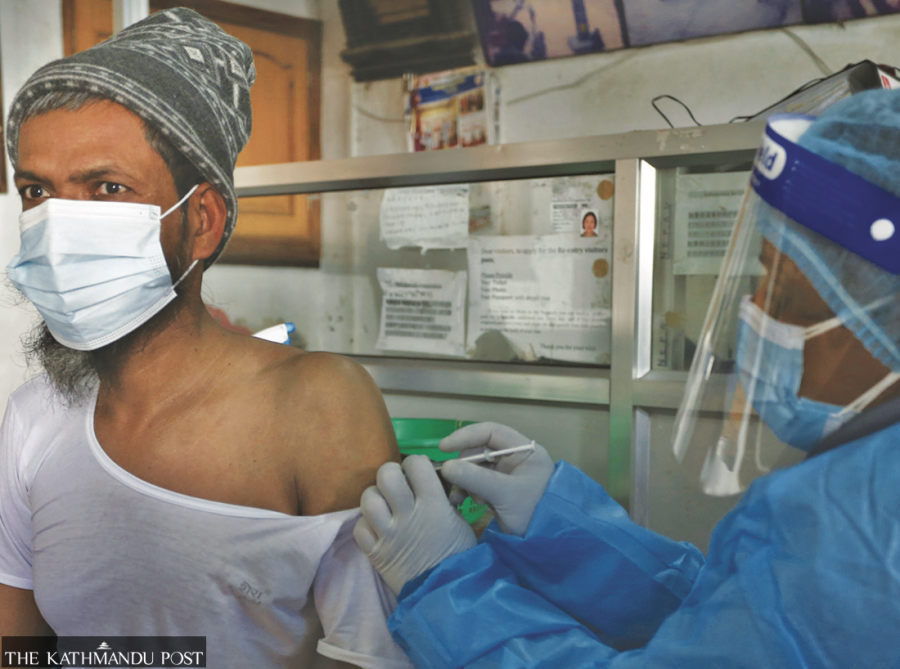Health
Covid booster uptake remains low
At the current pace, it will take over three years to administer the booster shots to all.
Arjun Poudel
The pace of Covid booster vaccinations, started some five weeks ago, is very slow, as only 943,956 people have opted for additional doses as of Wednesday.
Public health experts blamed the lethargic approach of the authorities concerned for the low uptake of booster shots and warned that taking the risk of infection lightly could prove costly to both the country and the people.
“Several studies, including one carried out in Nepal shows that the immunity level achieved from vaccination or natural infection wanes after six months of the vaccination or natural infection,” said Dr Prabhat Adhikari, an infectious disease and critical care expert. “Booster shots are needed to enhance the immunity level.”
After the third wave driven by Omicron, a highly contagious variant of the SARS-CoV-2, gripped the country, the Ministry of Health and Population started administering booster shots from January 17.
Frontline workers including doctors, nurses, paramedics, lab technicians, hospital staff and ambulance drivers were provided the booster shots in the beginning. Journalists, bureaucrats, lawmakers, those serving in diplomatic missions, financial institutions, prisoners, elderly people at old age homes and refugees who were vaccinated in the first phase of the immunization campaign starting January 27 were also offered booster shots.
Elderly people above 60, who were inoculated with Vero Cell vaccine, and those having comorbidities were offered the shots from January 28, and later to all people, who were inoculated with the second dose of vaccine six months ago.
“Nepal’s Covid-19 vaccination was problematic since the beginning,” said Dr Baburam Marasini, former director at the Epidemiology and Disease Control Division. “Earlier, there were problems due to vaccine shortages and mismanagement. But now despite having sufficient doses, they are unable to increase the vaccination pace.”
In the last 37 days around 25,500 people on an average have taken booster shots daily. And if the vaccination continues at the current pace, it would take more than three years for the authorities to administer the booster shots to all.
Some countries have already started fourth doses of Covid-19 vaccine and many have been providing the booster shots. The Health Minister started the booster shots only after the third wave gripped the country.
Despite recommendations by the National Immunisation Advisory Committee and public health experts, the Health Ministry delayed starting the booster shots.
Doctors serving at hospitals designated for Covid-19 treatment said that most of the infected patients, who became severe and died of the infection were elderly people and those having comorbidities. They say that a lot of lives could have been saved, had the authorities decided about the booster programme a little earlier.
When new cases rise, severity and deaths also rise and people proactively seek vaccination and booster shots. But this has not been the case during the third wave.
“Booster is necessary and it is the responsibility of the authorities to create the demand,” said Dr Jhalak Sharma, former chief of the National Immunisation Programme. “Communication gap should be narrowed down and a clear message should be provided to the intended recipients to encourage vaccination.”
Authorities have been providing the jabs from the immunisation centers to those, who reach there seeking the doses. Doctors say those who were aware of the importance of the vaccine have already received both doses and booster shots.
So far, 17,786,133 people or 60.9 percent of the total population have been fully immunised, according to the Health Ministry.
Officials at the ministry, however, said that the data is not accurate, as many fully immunised people have already taken booster shots even before the government launched the booster programme by lying they were not vaccinated.
“This is an open secret,” Dr Sangita Mishra, spokesperson for the Health Ministry, said. “Those who are aware and clever including health workers, journalists or other frontline workers and their family members took the booster shots saying that they have not yet inoculated.”
Immunisation workers could not identify whether a person is lying or telling the truth as the Health Ministry has not developed a database to identify people’s vaccination status.
“It is impossible to meet the target by thinking in a traditional way,” said Sharma, former chief of the National Immunisation Programme. “Massive awareness drives should be launched on the importance of booster shots, communication gaps should be filled and mass mobilisation should be done to increase the vaccine coverage.”




 11.84°C Kathmandu
11.84°C Kathmandu















